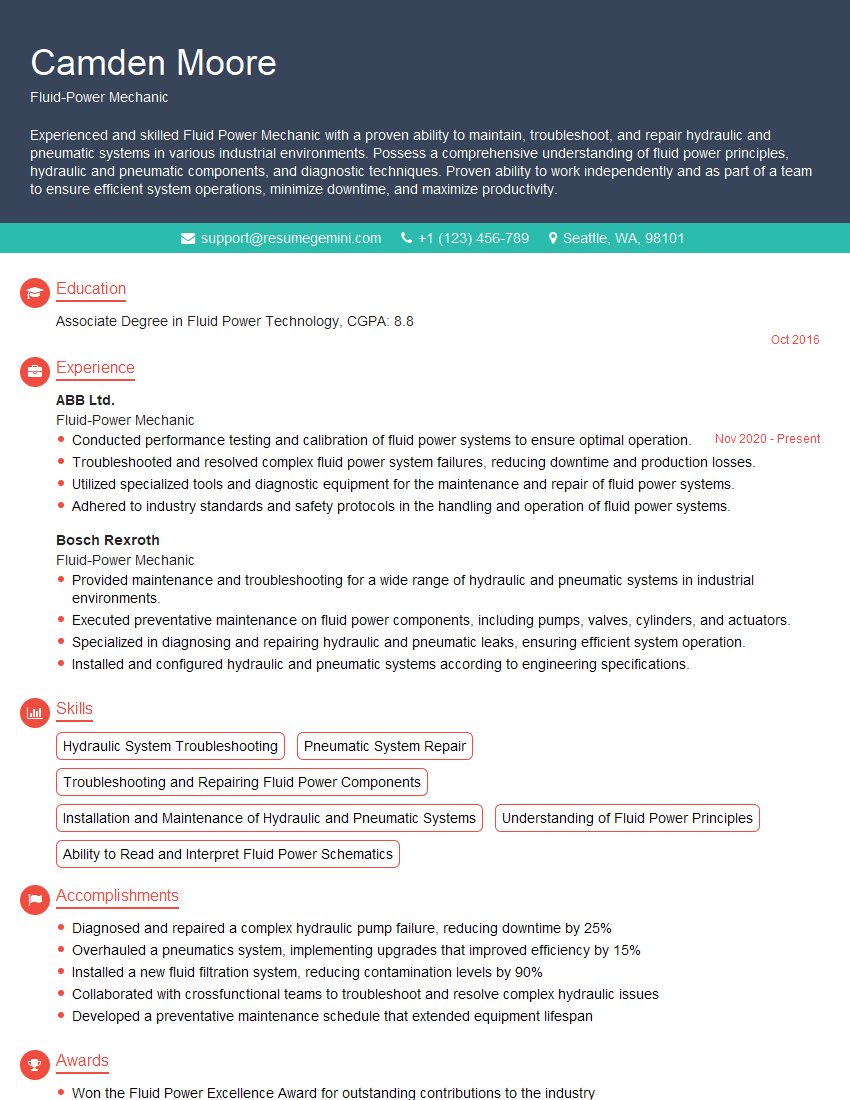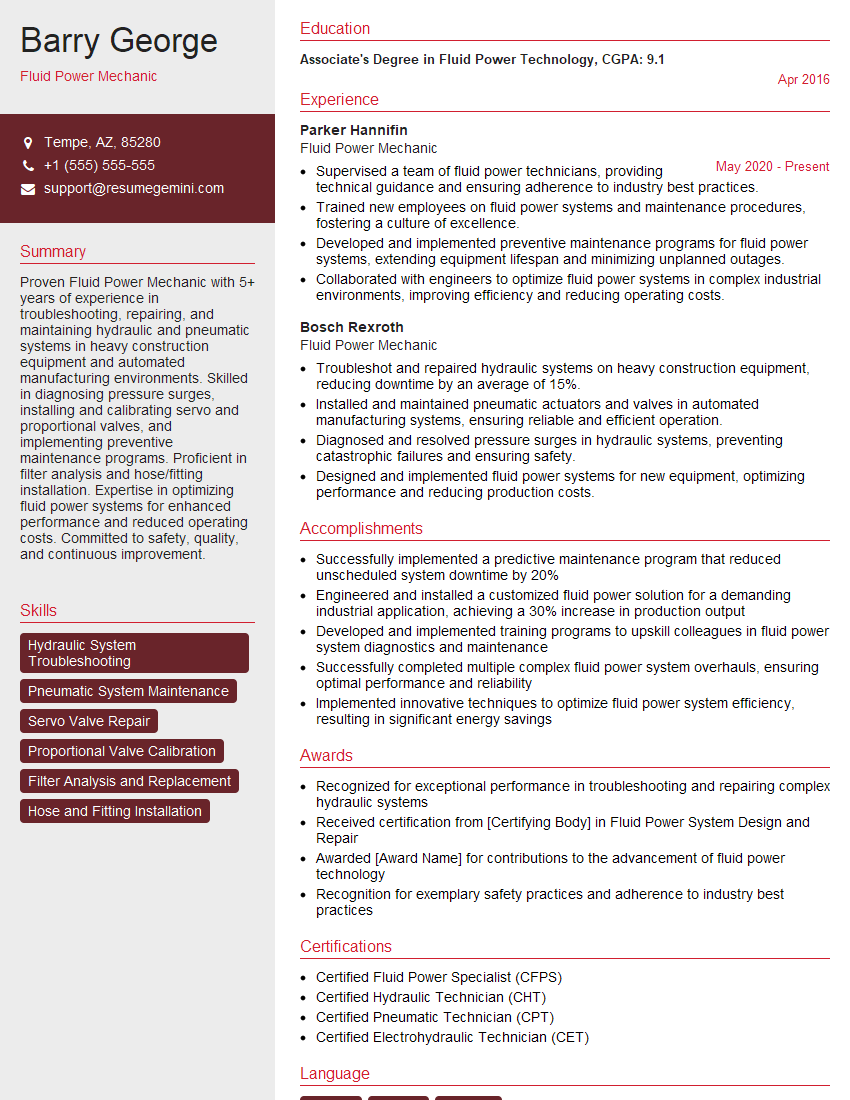Ever felt underprepared for that crucial job interview? Or perhaps you’ve landed the interview but struggled to articulate your skills and experiences effectively? Fear not! We’ve got you covered. In this blog post, we’re diving deep into the Fluid-Power Mechanic interview questions that you’re most likely to encounter. But that’s not all. We’ll also provide expert insights into the key responsibilities of a Fluid-Power Mechanic so you can tailor your answers to impress potential employers.
Acing the interview is crucial, but landing one requires a compelling resume that gets you noticed. Crafting a professional document that highlights your skills and experience is the first step toward interview success. ResumeGemini can help you build a standout resume that gets you called in for that dream job.
Essential Interview Questions For Fluid-Power Mechanic
1. Describe the function of a hydraulic filter and its importance in a fluid-power system?
A hydraulic filter removes contaminants from hydraulic fluid, protecting system components from wear and damage. It maintains the cleanliness of the fluid, extending the lifespan of pumps, valves, cylinders, and other components. A clean fluid reduces friction and heat generation, improving system efficiency and reliability.
2. Explain the operation of a pressure relief valve in a hydraulic circuit?
Principle of Operation
- Spool is held closed by spring force.
- When system pressure exceeds setpoint, spool opens.
- Excess fluid flows to reservoir, bypassing load.
Functions
- Protects system from overpressure.
- Limits maximum pressure in the circuit.
- Prevents damage to components.
3. Discuss the types of hydraulic pumps and their applications?
Gear Pumps: Positive displacement, low pressure, high flow rates. Used in general-purpose applications (lubrication, cooling systems).
Vane Pumps: Higher pressure than gear pumps, constant flow rates. Suitable for mobile equipment, machine tools.
Axial Piston Pumps: Variable displacement, high pressure and efficiency. Used in industrial applications, construction equipment.
Radial Piston Pumps: Compact, high pressure, low noise. Common in aircraft hydraulics.
4. Explain the purpose of a hydraulic accumulator and give examples of its use?
- Function: Stores hydraulic energy to provide pressure, flow, or power as needed.
- Types: Bladder, diaphragm, piston.
- Uses: Shock absorption, emergency backup power, energy storage, pulsation dampening.
5. Describe the different types of hydraulic cylinders and their applications?
- Single-Acting Cylinders: Force in one direction, spring or gravity return.
- Double-Acting Cylinders: Force in both directions, controlled by fluid flow.
- Telescopic Cylinders: Multiple stages, extended length.
- Applications: Lifting, clamping, steering, actuation.
6. Explain the concept of flow control and discuss different methods of achieving it in a hydraulic system?
- Flow Control Valve: Restricts or regulates flow rate.
- Throttle Valve: Manual adjustment of flow rate.
- Pressure Compensated Flow Control: Maintains constant flow rate despite pressure variations.
7. Discuss the principles of troubleshooting a hydraulic system?
- Identify symptoms: Leaks, noises, performance issues.
- Check fluid: Level, color, contamination.
- Inspect components: Pumps, valves, cylinders, hoses.
- Use diagnostic tools: Pressure gauges, flow meters, electrical testers.
- Consult system documentation and schematics.
8. Explain the safety precautions to be taken when working on hydraulic systems?
- Wear appropriate safety gear (gloves, glasses).
- Release system pressure before servicing.
- Use caution around high-pressure fluid and electrical lines.
- Be aware of potential hazards (burns, leaks, component failures).
- Follow manufacturer’s guidelines and industry standards.
9. Discuss the role of seals and gaskets in a hydraulic system and the factors affecting their performance?
- Function: Prevent fluid leakage, maintain pressure.
- Types: O-rings, gaskets, piston seals.
- Factors affecting performance: Material, temperature, pressure, lubrication.
10. Explain the importance of hydraulic fluid maintenance and the key parameters to monitor?
- Contamination Control: Filtering, inspection, fluid changes.
- Viscosity: Ensures proper component lubrication.
- Additives: Protect against wear, corrosion, foaming.
- Temperature: Monitoring, cooling systems.
Interviewers often ask about specific skills and experiences. With ResumeGemini‘s customizable templates, you can tailor your resume to showcase the skills most relevant to the position, making a powerful first impression. Also check out Resume Template specially tailored for Fluid-Power Mechanic.
Career Expert Tips:
- Ace those interviews! Prepare effectively by reviewing the Top 50 Most Common Interview Questions on ResumeGemini.
- Navigate your job search with confidence! Explore a wide range of Career Tips on ResumeGemini. Learn about common challenges and recommendations to overcome them.
- Craft the perfect resume! Master the Art of Resume Writing with ResumeGemini’s guide. Showcase your unique qualifications and achievements effectively.
- Great Savings With New Year Deals and Discounts! In 2025, boost your job search and build your dream resume with ResumeGemini’s ATS optimized templates.
Researching the company and tailoring your answers is essential. Once you have a clear understanding of the Fluid-Power Mechanic‘s requirements, you can use ResumeGemini to adjust your resume to perfectly match the job description.
Key Job Responsibilities
Fluid-Power Mechanics are responsible for the maintenance and repair of fluid power systems, which are used in a wide variety of industries, including manufacturing, construction, and transportation.
1. Troubleshooting and repairing fluid power systems
When a fluid power system malfunctions, it is the Fluid-Power Mechanic’s job to troubleshoot the problem and make repairs. This may involve replacing faulty components, adjusting system settings, or cleaning and inspecting the system.
- Diagnosing and repairing hydraulic systems
- Troubleshooting and repairing pneumatic systems
2. Installing and maintaining fluid power systems
Fluid-Power Mechanics may also be responsible for installing and maintaining fluid power systems. This involves following manufacturer’s instructions to ensure that the system is installed correctly and is operating safely and efficiently.
- Installing hydraulic pumps, motors, and cylinders
- Installing pneumatic valves, regulators, and filters
3. Testing and inspecting fluid power systems
To ensure that fluid power systems are operating safely and efficiently, Fluid-Power Mechanics must regularly test and inspect the systems. This may involve checking fluid levels, pressure, and temperature; inspecting for leaks; and performing other tests to ensure that the system is functioning properly.
- Testing hydraulic systems for leaks and pressure drops
- Inspecting pneumatic systems for leaks and blockages
4. Providing technical support
Fluid-Power Mechanics may also be responsible for providing technical support to other employees or customers. This may involve answering questions about fluid power systems, providing training, or troubleshooting problems.
- Answering questions about fluid power systems
- Providing training on fluid power systems
Interview Tips
Preparing for a Fluid-Power Mechanic interview can be daunting, but by following these tips, you can increase your chances of success.
1. Research the company and the position
Before your interview, take some time to research the company and the position you are applying for. This will help you understand the company’s culture and values, as well as the specific requirements of the job. You can find this information on the company’s website, in industry publications, or by talking to people who work for the company.
- Visit the company’s website
- Read industry publications
- Talk to people who work for the company
2. Practice your answers to common interview questions
There are a number of common interview questions that you are likely to be asked, such as “Tell me about yourself” and “Why are you interested in this position?” It is important to practice your answers to these questions so that you can deliver them confidently and concisely.
- Prepare answers to common interview questions
- Practice your answers out loud
- Get feedback from a friend or family member
3. Be prepared to talk about your experience and skills
The interviewer will want to know about your experience and skills in fluid power mechanics. Be prepared to talk about your work history, your education, and any certifications or training you have. You should also be able to provide examples of your work that demonstrate your skills.
- Highlight your experience in fluid power mechanics
- Discuss your education and training
- Provide examples of your work
4. Be professional and enthusiastic
First impressions matter, so it is important to be professional and enthusiastic during your interview. Dress appropriately, arrive on time, and be polite and respectful to the interviewer. You should also be prepared to talk about your goals and aspirations, and how you can contribute to the company.
- Dress appropriately
- Arrive on time
- Be polite and respectful
- Talk about your goals and aspirations
Next Step:
Now that you’re armed with interview-winning answers and a deeper understanding of the Fluid-Power Mechanic role, it’s time to take action! Does your resume accurately reflect your skills and experience for this position? If not, head over to ResumeGemini. Here, you’ll find all the tools and tips to craft a resume that gets noticed. Don’t let a weak resume hold you back from landing your dream job. Polish your resume, hit the “Build Your Resume” button, and watch your career take off! Remember, preparation is key, and ResumeGemini is your partner in interview success.

